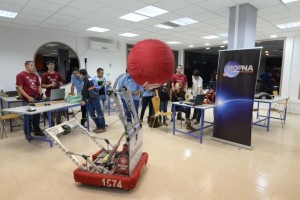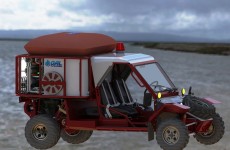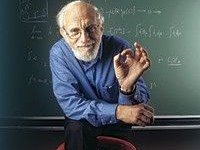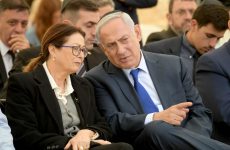
New technology and innovation hub opens in northern Arab-Israeli town to foster a unified youth movement of space-science enthusiasts.
Asaf Brimer spent 25 years in the Israeli air force and aerospace sector before an idea came into his mind like a shooting star across the horizon: He would bring Israeli Arab and Jewish students together through a collaborative research center focused on outer space.
Moona — a Space for Change officially opened in September last year in Majd Al-Kurum, a Muslim village 10 miles east of Acre (Akko) in the Western Galilee. So far, it has attracted about 100 high school students – roughly a 50-50 split between Jewish and Muslim teens – for weekly courses in robotics, drones, 3D printing, electronics and other technologies related to outer-space exploration. Families from the area also are welcome at Moona.
Brimer tells ISRAEL21c that he and his founding partner, Hussein Tarabeih, the Muslim head of Towns Association for Environmental Quality, wanted to connect Arab and Jewish citizens of the Galilee to one another and to the academic institutions and businesses of the region.
Moona means ‘wish’ in Arabic and sounds like ‘moon’ in English, while in Hebrew ’emoona’ means faith.
Visit from NASA administrator
These goals meshed with those of Israeli industrialist and philanthropist Stef Wertheimer, who has initiated several projects to enhance the job prospects of Arab-Israeli citizens of the Galilee, such as the Nazareth Industrial Park established in 2010. Wertheimer provided both funds and equipment for Moona, and his son Oren heads its board of directors, which is also evenly split between Arabs and Jews. Additional investment came from a crowdfunding campaign, private individuals and foundations, the Israeli government and the Galilee municipalities of Karmiel and Misgav. Wertheimer and former Israeli president Shimon Peres were on hand for Moona’s grand opening. Two years previously, the hub-to-be got a surprise boost from NASA Administrator Charles Bolden Jr.
Bolden was in Israel in January 2013 for the 10th commemoration of the Space Shuttle Columbia tragedy that took the life of Israeli astronaut Ilan Ramon. Brimer had been in touch with friends at NASA to announce his intention to open a technology hub “that is going to change society,” and word made its way up to Bolden.
At one time, the United States and the Soviet Union were the bitterest of enemies…But we’ve got to be willing to forgive people. And that’s hard work.
As soon as Brimer confirmed that Bolden was planning to come to the Galilee to meet with teens involved in the planning of Moona, he arranged for the students to stage a science fair in the town of Sakhnin for the NASA visitors. During Bolden’s visit he encouraged the teens to let go of historical enmity and work together on space research just as the United States and Russia managed to do. “At one time, the United States and the Soviet Union were the bitterest of enemies,” he told them. “But we’ve got to be willing to forgive people. And that’s hard work.”
This article has been republished with permission by www.ISRAEL21c.org. Click here to continue reading.




